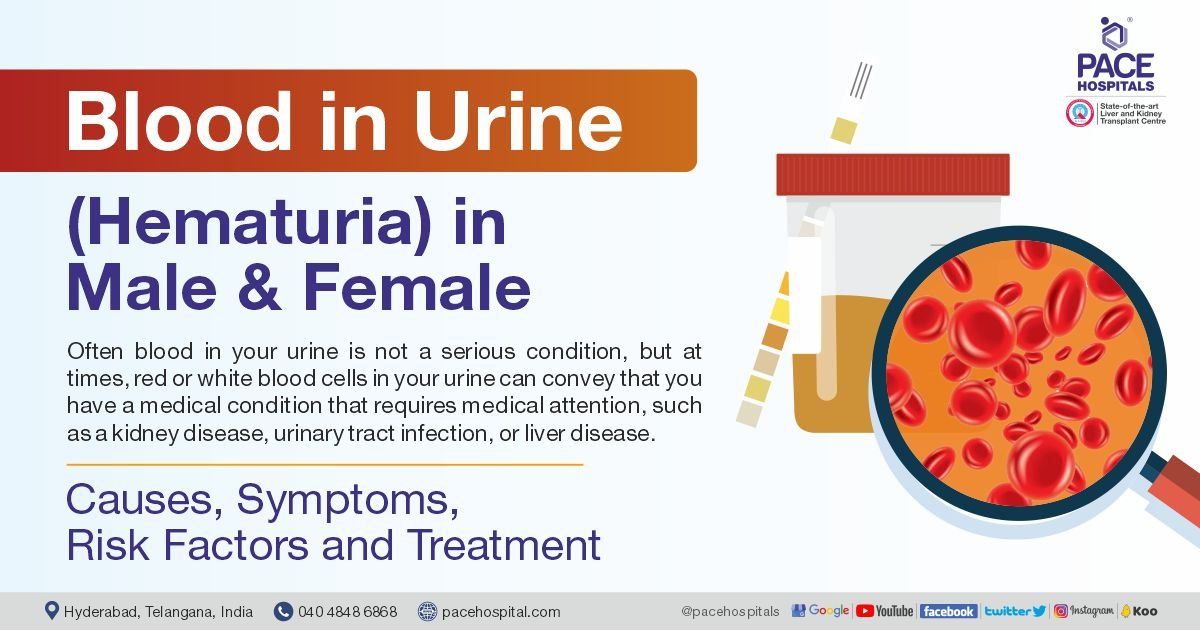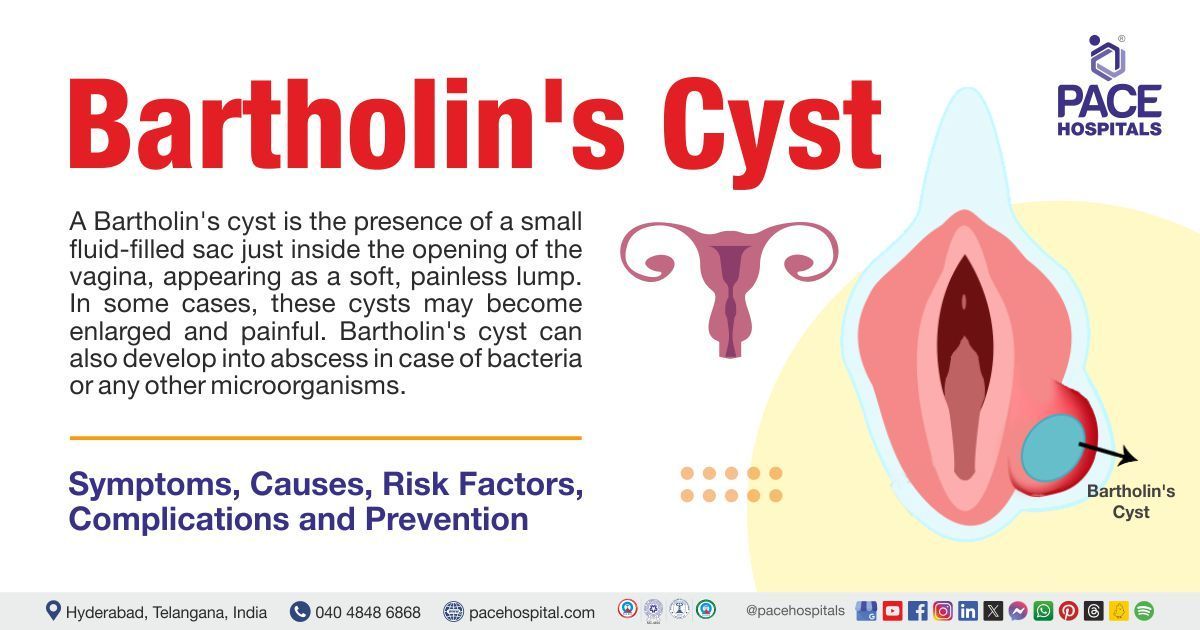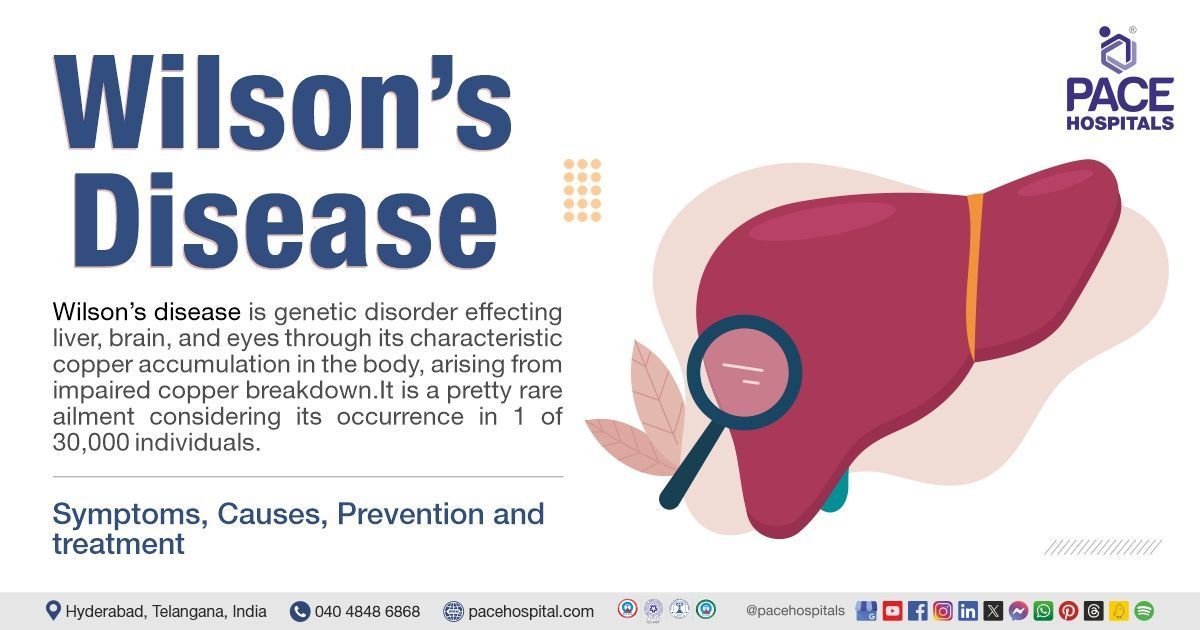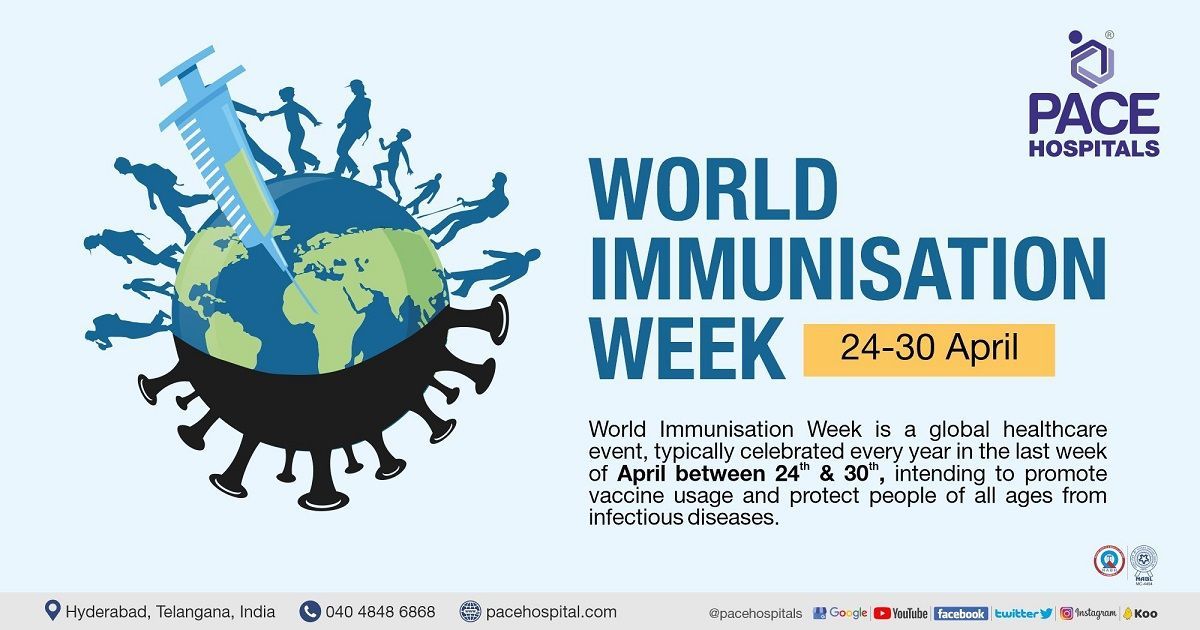Blood in urine (Hematuria) - Causes, Symptoms, Risk Factors and Treatment
Blood in urine medical term - Hematuria
Blood in urine or Hematuria is not a serious condition, but at times, red or white blood cells in your urine can convey that you have a medical condition that requires medical attention, such as a kidney disease, urinary tract infection, or liver disease.
Blood in urine - sounds like a scary phenomenon, yet sometimes it’s not a cause for worry; still you shouldn’t ignore it because it can point towards a bigger underlying condition. Consult your primary care physician as he can prescribe you the tests to look for the cause.
Reasons for blood in urine in male and female
These are some of the reasons that can cause blood in urine in male and female both:
- Urinary tract infection- Infection manifests itself when bacteria move up the urethra, the tube that carries the urine outside the body from the bladder. The infection can move into the bladder and even into the kidneys. It often causes pain and a need to urinate frequently.
- Bladder and kidney stones (nephrolithiasis) - Another reason for blood in the urine is the presence of stones in the bladder or kidney. The stones are crystals that appear from the minerals in your urine. They can develop within your kidneys or bladder.
- Injury to the urinary tract
- Viral illness such as hepatitis
- Pyelonephritis (UTI that has reached as far as the kidney)
- Kidney disease, such as polycystic kidney disease
- Sickle cell disease (sickle cell anaemia)
- Haemophilia - a rare blood-clotting disorder
- Bladder cancer (bladder carcinoma)
- Kidney cancer
- Exercise induced - Strenuous exercise, Injury, such as from sports or a blow to the kidneys can also cause blood to be visible in the urine.
- Inflammation of the kidney, bladder, urethra, or prostate
- Medications- Certain medications can cause blood in urine. Like penicillin and aspirin.
- Recent catheterization
Apart from above, there are some specific reasons that are different in male and female
Specific reasons of blood in urine related to female
- Menstruation
- Endometriosis—a problem in women that occurs when the kind of tissue that normally lines the uterus grows somewhere else, such as the bladder
Specific reasons of blood in urine related to male
- Enlarged prostate (benign prostatic hyperplasia) - usually in middle age or older men
- Prostate cancer
Types of Hematuria
There are generally two types of Hematuria:
- Gross Hematuria
- Microscopic Hematuria
In Gross Hematuria person- can see the blood in his or her urine & the urine is overtly bloody, smoky, or tea colored, whereas in Microscopic Hematuria person can’t see the blood. Only a pathologist can see the blood through a microscope.
Symptoms of blood in urine (Hematuria)
Small amount of blood can cause change in the color of urine, sometimes people don’t have any symptoms apart from the color change in urine. These are some common symptoms of blood in urine:
- Red, pink or brown colored urine
- Blood clots in urine
- Pain in upper abdomen or pain in back
How are the causes of blood in urine diagnosed?
A general physician can diagnose blood in urine by getting your previous medical history with the help of these methods. In case nothing is found, a doctor may assess your level of risk for cancer.
- Physical examination such as digital rectal exam in men and pelvic exam in women to check for problems that may be causing blood in the urine.
- Urinalysis- A urinalysis encompasses examining the appearance, concentration and content of urine to determine and manage a wide range of ailments such as urinary tract infections, kidney disease and diabetes.
- Blood test - A blood test can indicate high levels of creatinine, a waste product of normal muscle breakdown, which may indicate kidney disease.
- Urine culture-A urine culture is a test to find germs (such as bacteria) in the urine that can cause an infection
- Kidney Biopsy - The biopsy can help in diagnosing if the blood in urine (Hematuria) is due to kidney disease.
- Urine cytology- Urine cytology is a test that looks for abnormal cells in urine under a microscope.
- Cystoscopy - Cystoscopy is endoscopy of the urinary bladder via the urethra.
- A CT urogram- It may be helpful in diagnosing urinary tract conditions such as: Kidney stones or bladder stones.
- Magnetic resonance imaging (MRI) - An MRI can help diagnose problems in the bladder or kidney.
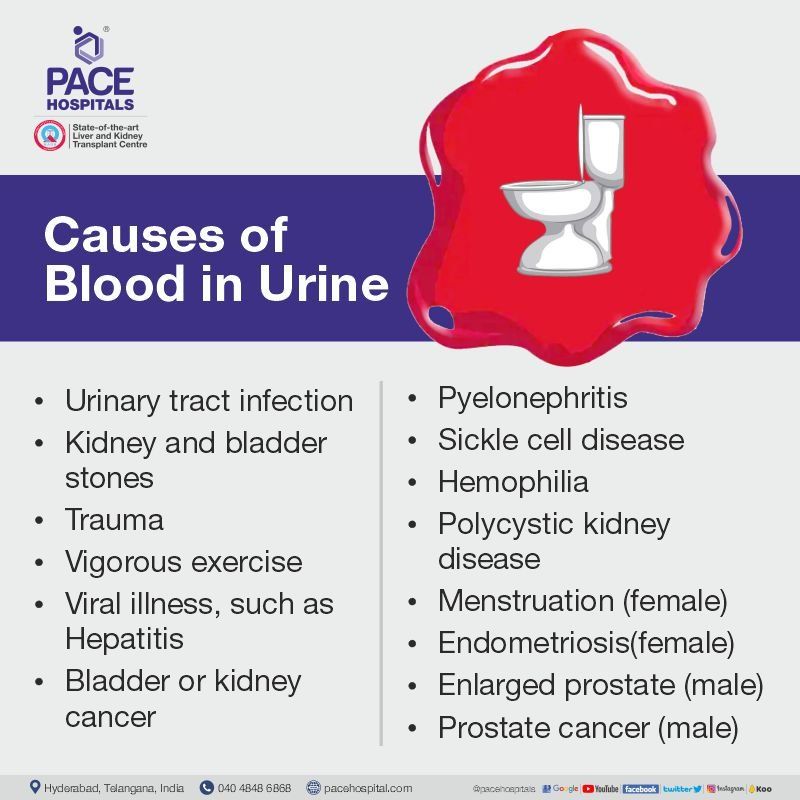
When do I need to see a doctor?
Consult a general physician immediately if you have one or more of these symptoms:
- Nausea
- Vomiting
- Fever
- Chills
- Pain in your side, back, or abdomen
How can I prevent Blood in urine?
Preventing Blood in urine means preventing the underlying causes:
- To prevent infections, drink plenty of water daily, urinate immediately after sexual intercourse, and practice good hygiene.
- To prevent stones, drink plenty of water and avoid excess salt and certain foods like spinach and rhubarb.
- To prevent bladder cancer, refrain from smoking, limit your exposure to chemicals, and drink plenty of water.
What are the risk factors for blood in urine?
Anyone including children can have blood in urine, these are some of the risk factors:
- Certain medications, such as blood thinners, aspirin and other pain relievers
- Strenuous or Vigorous exercise
- Have a bacterial or viral infection, such Hepatitis
- Family history of kidney disease
Treatment for blood in urine
Based on the conditions, a primary care physician may prescribe medicines to treat the underlying symptoms. Further, based on the diagnosis, if required, surgical treatment would be advised such as removal of kidney stones or bladder stones.
In some of the cases there is no treatment required. Further, it’s important for a person to follow up with a primary care physician to make sure there is no blood in urine.
Can uterine prolapse cause blood in urine?
Yes, mucosal trauma caused by the prolapse may cause blood in urine.
When it might be something else
It may not be blood in your urine if:
- You've recently eaten beetroot
- You're taking a new medicine
- You're bleeding from your bottom instead
- It's happening during your period
Are blood clots in urine an emergency?
Yes, if you are passing different-shaped clots in your stream, they could represent bleeding from the urethra in women or prostate in men. Clots can be wormlike, and if associated with pain it could represent clots coming from your ureters (tubes from your kidneys to your bladder).
Is Hematuria dangerous?
No, Hematuria is not generally dangerous condition and can be treated by medical or surgical interventions. But it can point to a life- threatening underlying condition such as Kidney cancer, Prostate cancer, sickle cell disease etc. that require immediate medical attention.
What to expect from a doctor when going for appointment?
During doctor consultation, doctor might ask these questions. Providing detailed information will help in getting the best treatment for blood in urine.
- Do you feel pain while passing urine?
- Do you see blood while urinating sometimes or every time?
- When do you see blood in urine - starting of urination, ending of urination or throughout urination?
- Do you notice blood clots during urination?
- Do you smoke?
- Are you exposed to chemicals, if then what kind?
- Have you been through radiation therapy?
Is it normal to have a small amount of blood in urine?
Blood in urine is called haematuria. It can be frightening but not life-threatening. If anyone notices blood in urine, don't ignore it because this condition may indicate underlying causes such as bladder infection, kidney infection, kidney stones, certain kidney diseases, enlargement of the prostate, vigorous exercise or injury. There is no single specific treatment for all cases of haematuria. Instead, treatment can be aimed at treating the underlying cause.
Request an appointment
Fill in the appointment form or call us instantly to book a confirmed appointment with our super specialist at 04048486868
Appointment request - health articles
Thank you for contacting us. We will get back to you as soon as possible. Kindly save these contact details in your contacts to receive calls and messages:-
Appointment Desk: 04048486868
Whatsapp: 8977889778
Regards,
Pace Hospitals
Hitech City and Madinaguda
Hyderabad, Telangana, India.
Oops, there was an error sending your message. Please try again later. We will get back to you as soon as possible. Kindly save these contact details in your contacts to receive calls and messages:-
Appointment Desk: 04048486868
Whatsapp: 8977889778
Regards,
Pace Hospitals
Hitech City and Madinaguda
Hyderabad, Telangana, India.

Our Locations
Subscribe to our newsletter and stay updated with the latest health information.
By clicking on subscribe now, you accept to receive communications from PACE Hospitals on email, SMS and Whatsapp.
Subscribe to PACE Hospitals News
Thank you for subscribing. Stay updated with the latest health information.
Oops, there was an error. Please try again submitting your details.
-

Payment in advance for treatment (Pay in Indian Rupees)
For Bank Transfer:-
Bank Name: HDFC
Company Name: Pace Hospitals
A/c No.50200028705218
IFSC Code: HDFC0000545
Bank Name: STATE BANK OF INDIA
Company Name: Pace Hospitals
A/c No.62206858997
IFSC Code: SBIN0020299
Scan QR Code by Any Payment App (GPay, Paytm, Phonepe, BHIM, Bank Apps, Amazon, Airtel, Truecaller, Idea, Whatsapp etc)
Call us at 04048486868
ADDRESS
PACE Hospitals
Hitech City : Beside Avasa Hotel, Pillar No. 18, Hyderabad - 500081
Madinaguda: Mythri Nagar, Beside South India Shopping, Madinaguda, Hyderabad - 500050
QUICK LINKS
Disclaimer
General information on healthcare issues is made available by PACE Hospitals through this website (www.pacehospital.com), as well as its other websites and branded social media pages. The text, videos, illustrations, photographs, quoted information, and other materials found on these websites (here by collectively referred to as "Content") are offered for informational purposes only and is neither exhaustive nor complete. Prior to forming a decision in regard to your health, consult your doctor or any another healthcare professional. PACE Hospitals does not have an obligation to update or modify the "Content" or to explain or resolve any inconsistencies therein.
The "Content" from the website of PACE Hospitals or from its branded social media pages might include any adult explicit "Content" which is deemed exclusively medical or health-related and not otherwise. Publishing material or making references to specific sources, such as to any particular therapies, goods, drugs, practises, doctors, nurses, other healthcare professionals, diagnoses or procedures is done purely for informational purposes and does not reflect any endorsement by PACE Hospitals as such.

